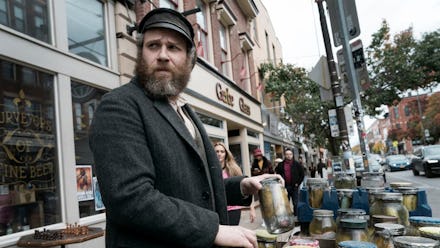Is Seth Rogen's 'An American Pickle' neoliberal propaganda?

In 2008, when Seth Rogen's stoner flick Pineapple Express hit theaters, it marked the beginning of Rogen's tenure as America's pothead-in-chief. Over the years, he's delivered reliably affable performances in a loose constellation of Judd Apatow films, as well as a few controversial productions — the 2014 movie The Interview famously heralded an international crisis. He's also become one of pop culture's more inoffensive figures, signaling a political ideology that, at the very least, doesn't suck. But, confoundingly, Rogen's latest, An American Pickle, conveys the sensibility of a right wing pundit whose joke about "cancel culture" got optioned into a movie.
A seemingly harmless turn on Rip Van Winkle that relies on pickle brine instead of sleep, Rogen's HBO Max exclusive bears the marketing material of something more serious, or at least more focused. The movie's official poster features a historical looking image of a bearded Rogen staring seriously into the camera, as though the film is about a metaphorical pickle — which America has certainly found itself in — and not actually, well, pickles. But incongruity can be funny. Sausage Party, another controversial Rogen flick, looks a lot like a kids' movie despite being perhaps the worst thing you could expose a child to.
But An American Pickle is confusing for more reasons than its advertising. The plot basically goes as follows: Herschel Greenbaum (Rogen) is a Jewish immigrant at the turn of twentieth century in New York who finds work at a pickle factory in order to pay for a nice grave for him and his wife Sarah Greenbaum (played by Sarah Snook, though her character has just a few lines.) After an accident, Greenbaum is brined (embalmed? preserved?) in pickle juice for a century.
The improbable premise somehow becomes the most realistic part of the movie as the plot wears on. As soon as Greenbaum meets his only living relative, his great grandson Ben Greenbaum (also Rogen, get it?), he resolves to help him be less of a loser. Reticent to receive this help, and ostensibly aghast that a man from 100 years in the past has bad politics, the younger Greenbaum plots to get his great grandfather out of his hair.
So, to be clear, a complete miracle of medical science with implications for the future of humanity is a burden to our twenty-something protagonist, who is primarily concerned with his start-up idea, Boop Bop? To make matters worse, the younger Greenbaum's poorly named tech platform is supposed to let you check a company's ethics before buying from them, as if there was such a thing as ethical consumption under capitalism. It all amounts to a character fashioned after tired tropes about millennials. Ben is basically a David Brooks column come to life, which wouldn't be so grating if it weren't for An American Pickle's central plot point. Fed up with his miraculous great grandfather's prodding, Ben plots to have him canceled by the all-powerful mob of Twitter, encouraging Herschel to express his literally 100-year-old opinions on the app.
This is where things get annoying. After having one of his unpaid interns draft a spree of absurd tweets for him, Herschel finds himself on the wrong side of history. A mob forms outside of his humble pickle stand and he is summarily "cancelled." The whole thing is not even remotely funny, unless you are wildy credulous of the invisible Twitter mob who, presumably, would possess none of the intellectual capacity required to contextualize a 100-year-old man's tweets. That, or you've spent the most tumultuous year in recent memory signing open letters about "free speech."
The stakes in the film, like the stakes for anyone concerned in 2020 about young people stifling free speech, are preposterously low. And still, An American Pickle doesn't even take itself seriously enough, as a piece of cinema, to be interpreted nefariously. The movie feels more like an algorithm scanned Twitter for the past year and spit out a script, a far scarier prospect than any online mob.